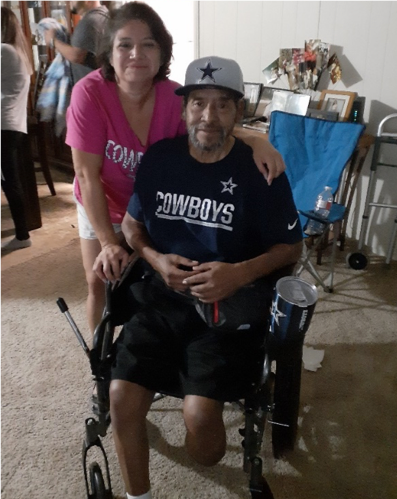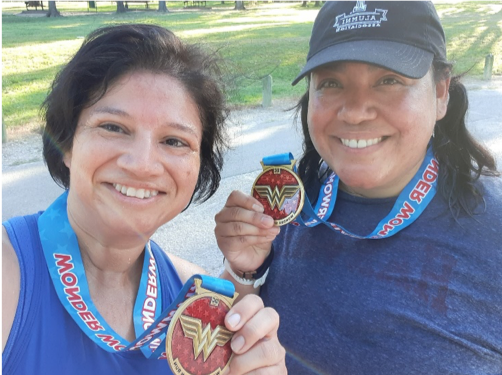Lupe

Lupe has overcome uncertainty with restored confidence, removing barriers that kept her from managing her type 2 diabetes to claim her second chance at the life of her dreams.
A self-described “weirdo” who loves analyzing datasets and solving mind-bending puzzles, Lupe Barraza wears many hats. She’s a busy CPA for a large health care organization, a PhD student and a mother of six children, three of whom are still at home.
She’s also an avid runner, jogging 100 miles per month for health, fitness and stress relief.
“It makes me feel good and keeps me sane,” she said. “I’ve been down quite a road, and this is my time.”
Fitness hasn’t always been her story, but it’s a major key to her comeback.
We teamed up with Inside Edition to share Lupe’s story.
#Type2Take2 #sponsored

First married at 18, Lupe went on to have four children in quick succession. Slowly her weight crept up and her doctor told her she had prediabetes. It was tough to hear, but not a surprise. Her father and all but one of his 12 siblings had battled diabetes and suffered amputations, strokes, heart disease and chronic kidney disease as a result.
“He’s one of two survivors,” Lupe said. “I’ve seen so many of my aunts and uncles go in for amputations and it shocks their system so much that they don’t make it.”
In an effort to get healthy, Lupe started running, which helped get her numbers under control. She ran 10 marathons and two ultramarathons. At the same time, she transitioned from a stay-at-home mom to a full-time college student, earning both bachelor’s and master’s degrees—and passing the CPA—in three years.
In the process, Lupe’s marriage fell apart, and the couple divorced. Less than a year later, she married a childhood friend.
“Talk about rebound,” she said. “That relationship catapulted me into being the sickest I’ve ever been.”

Within months, Lupe realized her new husband struggled with substance abuse, and he had trouble holding a job. Always trying to keep the peace, she stopped running, neglected her diet, gained almost 80 pounds and developed type 2 diabetes. When she ate healthy foods, he mocked her and tried to make her feel guilty.
“I had to eat what he made me,” she said. “If I tried to follow a diet, that was insulting to him.”
Lupe asked her husband to leave on more than one occasion, but he refused. One weekend, he hit her and spent several months in jail. It was about that time when Lupe’s hands and feet began tingling, often painfully enough to wake her up in the middle of the night—a result of nerve damage from high blood glucose. It hurt so bad she couldn’t squeeze her hands.
“I was not well at all,” Lupe said. “But I didn’t know how to fix it. I had isolated myself from my family and friends and was very alone.”
More than the unhealthy eating habits and lack of exercise, Lupe said, stress played a huge part in her uncontrolled diabetes.
“Why wasn’t I taking care of myself” she asked. “In my culture, you don’t give up your husband. You shut up and be a good wife, and that’s what I did. But by doing that, I was killing myself.”

Ultimately, Lupe filed for divorce. On her own for the first time and determined to get healthy, Lupe worked with Dr. Naureen Agha, an American College of Physicians fellow, to formulate a plan. Medication keeps her blood sugar and high blood pressure under control. And she has recommitted to a healthier diet, opting for low-cab, low-fat meals like grilled chicken with chickpea pasta instead of fast food. And—perhaps most therapeutic—she picked back up her running shoes.
The changes have paid off: She’s down 55 pounds, and her A1C has gone from 11.5 to 5.4.
“Lupe does the work and has completely changed her life – one little bit at a time,” Agha said, describing her as one of her favorite patients. “She’s only on one medicine for diabetes now and it’s half the dose it was before.”

“Managing diabetes and heart health isn’t always as simple as eating better or exercising more. Oftentimes, we have to take a step back and ask ourselves what’s keeping us sick,” Lupe said.
Now, Lupe hits the streets nearly every morning and takes a longer run on the weekend preparing for her “comeback marathon”.
“I’m making my way back and just feeling good about myself again. I have control over my choices and I’m choosing to take care of me,” she said.




